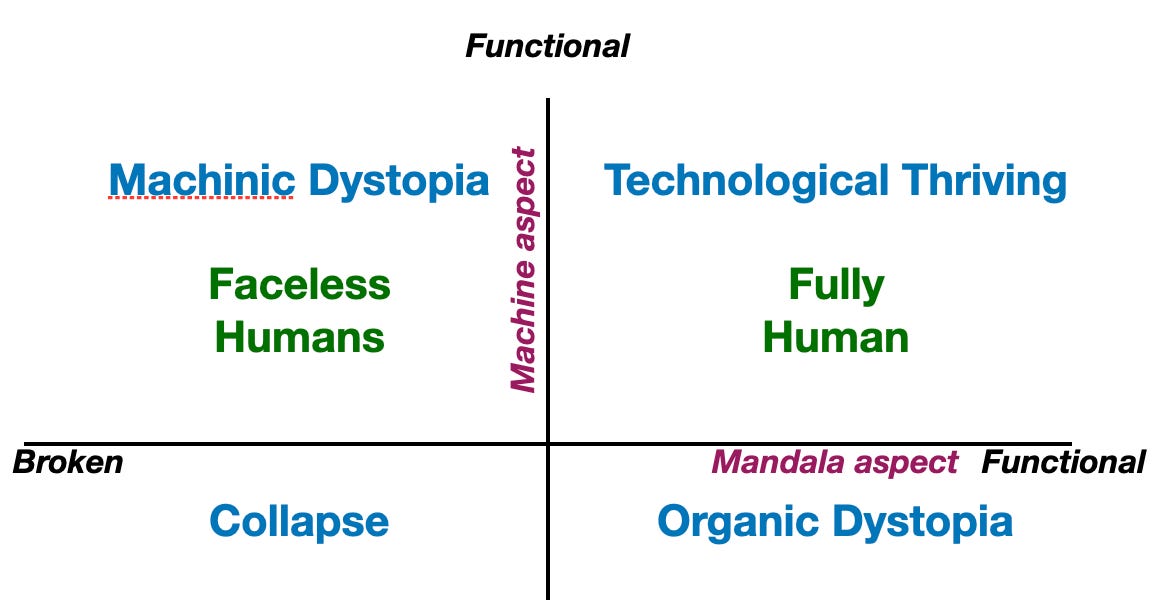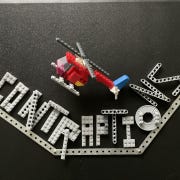Weeknotes 314 - Reimagining Engagement with Bottom-Up Intelligence
This week’s thoughts are triggered by the graduation work of Lisa. And next to that some highlights from the tech societies and futures news.

Heated times. Not only because of bitcoins (from 62k to 83k now, in just a week); but of course… that elections… Maybe it is better to ignore the results of last week’s elections and all the offspring of the polarization in the Netherlands resulting in (or ignited by) even more self amplifying radical politics. Is there a way out, can we unite for strategizing a better use of tech. Do we need to reboot the Tech Solidarity gatherings, that we started in the aftermath of the 2016 shock?
There is a link with the triggered thought from this week, on bottom-up intelligence (should it be reframed to grassroot intelligence?).
Triggered thought of the week is about the notion of “bottom-up intelligence”, that was the key of the graduation of Lisa last Monday (Bottom-up intelligence: Exploring the role of agents for mobility orchestration in Negen Straatjes, Amsterdam). As time was limited this week for the newsletter, with a packed weekend and a Monday full of meetings, I dictated my thoughts while commuting and asked our AI helpers to produce a rewrite. With some tweaks, it is not too bad.
Oh, and check out the program additions on TH/NGS 2024.
Triggered thought
In an era where AI and algorithms increasingly shape our daily experiences, a novel concept is emerging that could revolutionize how we interact with our cities: bottom-up intelligence. This idea, explored in Lisa Laverman's recent graduation project at TU Delft, challenges the conventional top-down approaches to urban planning and offers a fresh perspective on creating more responsive, dynamic urban environments.
But what exactly is bottom-up intelligence, and why should it matter to city dwellers and visitors alike?
Imagine a city that doesn't just dictate your path or choices but learns from and adapts to the collective behaviors and needs of its inhabitants. Unlike traditional systems that rely on predetermined data and generic algorithms, bottom-up intelligence proposes an organic, inclusive approach to urban management. It's about cultivating a city's smarts from the ground up, using real-time interactions and subtle, genuine nudges rather than rigid, preordained guidance.
Laverman's project, focused on enhancing the experience of Amsterdam—a city often grappling with the dual impact of tourism on its economy and social fabric—offers a practical application of this concept. Instead of a centralized navigation system directing tourists and residents, her vision involves a more nuanced, adaptive intelligence. This system would "learn" from lived experiences, crafting routes and suggestions based on real-time community input and observations of daily life.
This approach resonates with the principles of self-organizing systems, drawing inspiration from decentralized software models and grassroots organizations. It's about fostering an intelligence that grows from within rather than imposing from above. Unlike static systems, bottom-up intelligence emerges and evolves from continuous, dynamic interactions, recognizing the complexity and variability of human behavior.
The contrast with centralized algorithms becomes stark when we consider real-world examples. When a journalist at The New York Times handed over all her decision-making to AI for a week, the outcome was blandly average—safe, predictable, and uninspired. This reflects a broader problem with top-down systems that rely on aggregate data rather than individual experiences, often resulting in a homogenized existence that fails to capture the vibrancy of urban life.
Bottom-up intelligence, on the other hand, doesn't just read intentions or patterns; it "lives" within them. It acts as a dynamic agent that responds to users, influencing and adapting to their behavior in ways that feel organic rather than prescriptive. Instead of categorizing people into rigid profiles, it offers adaptable insights, stimulating engagement without constraining individuals to predefined roles.
But how does this benefit the broader community, especially those who might not actively engage with such a system?
The beauty of bottom-up intelligence lies in its inclusive nature. While not every resident may directly interact with the system, the cumulative insights generated benefit everyone. It's a distributed, low-key form of profiling that focuses on behaviors rather than identities, valuing interactions not only among people but between people and their environment. This creates an ecology of interactions that the intelligence system continuously learns from and responds to.
However, as with any data-driven system, questions of privacy and data use naturally arise. How can we ensure that this bottom-up approach respects individual privacy while still gathering meaningful insights? This is an area where careful implementation and transparent policies will be crucial.
Looking ahead, the potential of bottom-up intelligence in urban settings is vast. It offers the promise of cities that foster a living, evolving dialogue with their inhabitants. By building intelligence from the ground up, we're not just creating better-informed cities; we're paving the way for more authentic, engaging, and ultimately more humane urban experiences.
In a world increasingly characterized by cookie-cutter algorithms and homogenized experiences, bottom-up intelligence stands as a refreshing alternative—a call to reconnect with the rich, unscripted reality of urban life. As we move forward, the challenge lies in translating this concept into practical, widely-implemented systems that can truly transform our urban landscapes.
The journey towards bottom-up urban intelligence is just beginning. It invites us to reimagine our relationship with our cities, not as passive inhabitants, but as active participants in an ever-evolving urban narrative. How will you engage with your city differently, knowing it could be listening and learning from every step you take?
For the subscribers or first-time readers (welcome!), thanks for joining! A short general intro: I am Iskander Smit, educated as an industrial design engineer, and have worked in digital technology all my life, with a particular interest in digital-physical interactions and a focus on human-tech intelligence co-performance. I like to (critically) explore the near future in the context of cities of things. And organising ThingsCon. I call Target_is_New my practice for making sense of unpredictable futures in human-AI partnerships. That is the lens I use to capture interesting news and share a paper every week.
Notions from the news
The elections were dominating the news not only in the States but also in combination with the lack of time this week and a limited number of links.
There are related stories of course. A lot. Was it the podcast elections more than the AI elections? How to rebuild society?

Spying devices. Check also this workshop

Last week in the triggered thought.

Human-AI partnerships
Two weeks ago I reflected on the Design & AI symposium keynotes, and Tobias Revell has posted his own reflections too. I missed the even more counter presentation of his point.
Check Apple Intelligence in the box.
Robotic performances
First view looked as a tiny robot but it is tank after all.
Immersive connectedness
It is not the first time that AGI and LMM have declared to be on the fringe of an economics collapse.
Another edition in slow tech in cameras.
Evolution is going fast. Digital can benefit child development.
These spying devices feel like an old story, but it is still the fear, and now what with genAI capabilities?
Tech societies
This long read by Venkatesh Rao feels like something to dive deep into: a new balanced society between Mandalas and Machines. I will listen to the NotebookLM podcast.
Another potential election result is rising trust in prediction markets over polls. However it is also a self-fulfilling mechanism.
Twitter (X) is now perceived as the Trump campaigner. People in the US seems looking at ending the use.
The use in search is changing; is it the Death of Search.
Paper for the week
Linked to the triggered thought, is this thesis. Something for the reading list.
Generous cities – weaving commons-oriented systems for the reuse of excess materials in urban contexts
This thesis explores the transformative potential of reshaping the way cities handle excess materials. In particular, it explores a shift from industry-oriented waste management to community-based waste prevention through practices of reuse at a local level. The central research question addressed is: ‘How can practices of reuse contribute to reimagining and reshaping the way cities handle excess materials?’.
Schmidt Fonseca, F. (2024). Generous cities–weaving commons-oriented systems for the reuse of excess materials in urban contexts (Doctoral dissertation, Northumbria University).
Looking forward
It is always pleasant and inspiring to talk to workshop hosts and other contributors to TH/NGS to learn what their plans are. Also doing interviews for the explorative project is delivering more and more resolution to the balance of concepts as layered governance, commons as economic model and current-sees to support agency in complex systems.
Today I will do another presentation and workshop linked to the Generative Things, this time for master student at the new master Health by Design of Avans, as part of the human-object relations track. And Thursday a new workshop with the Wijkbots will happen at Wijkcooperatie.
Next week I might visit the Sensemakers meetup, and look forward to the PhD defense of Iohanna on more than human design.
Enjoy your week!



